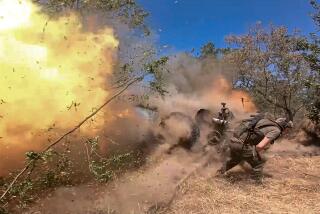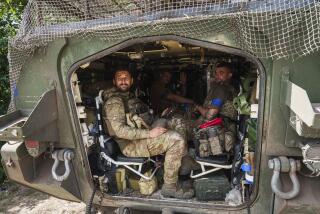Ukrainian Nationalist Movement: Challenge Growing From Within : Soviet Union: Legalized less than a month ago, Rukh already has remarkable influence in the second-largest republic in the nation.
LVOV, Soviet Union â A foreign visitor to this city in the western Ukraine recently tried to make an overseas telephone call, a request the hotel operator rejected as impossible.
The visitor then approached the hotel manager, who said she too was powerless to help. âIâm just a government official,â the manager said. âYouâd better ask Rukh.â
Rukh--the word means âthe movementâ in Ukrainian--has remarkable influence in the Soviet Unionâs second-largest republic despite being legalized less than a month ago. Not only can it mysteriously transmit a fax to Chicago and arrange impossible-to-buy airline tickets, but its offices are filled with the young, the old and the lame seeking favors or help from the huge Soviet bureaucracy.
Not long ago, this kind of patronage was the sole province of the Communist Party, which for all its shortcomings was the only political force in the country. Rukh has come up from the grass roots and harnessed a burgeoning dissatisfaction with Communist rule here into a potent political alternative.
âOur popularity is very simple to explain,â said Lubomir Senyk, a deputy leader of Rukh in Lvov. âThe people donât trust the Communist Party anymore. Under the party, the Ukrainian people have known nothing but 70 years of trouble. The final goal of Rukh is an independent, united country of the Ukraine.â
Although Rukh had just 280,000 members at its founding last September, it managed to organize a human chain in January which stretched from Lvov to Kiev, a distance of more than 300 miles and utilizing more than 1 million people.
âThe influence of Rukh is quite significant,â said Valery Matvyenko, deputy head of the Communist Partyâs ideological department in Kiev, the Ukrainian capital. âMany of Rukhâs representatives are patriots whose goals are noble. But so far, Rukh is not an alternative party.â
Just how popular Rukh has become may become evident Sunday, when voters in the Ukraine select a new 450-seat parliament to govern their republic. Since Rukh was not legally recognized until Feb. 9, the group had little opportunity to draw up its own list of candidates. But independents are running against Communist Party-sponsored candidates in nearly every race, and the independents have largely gone over to Rukh .
For example, at a legally sanctioned candidates meeting in Lvov on Thursday, three independent candidates withdrew from the race in the space of 10 minutes in favor of the Rukh - endorsed Mikhailo Goryn, who spent 12 years in jail for promoting Ukrainian nationalism.
As the crowd of more than 1,000 chanted âDown with the red flag,â speakers from the Communist Party were jeered and insulted. When Goryn spoke, the crowd waved the blue-and-yellow banner of Vladimir, a feudal knight who brought Christianity to the Ukraine, which is now the official Rukh flag.
Goryn drew applause from the crowd by calling them âladies and gentlemen,â dispensing with the usual Communist greeting of âcomrades.â Launching into an attack on rule by Moscow, Goryn declared that the Ukraine âhas not been working in the national interest, but in the interest of the empire.â
According to Ivan Gel, another Rukh activist in Lvov, the question of economic independence from Moscow is the hottest issue in the current election, with the Communist Party and Rukh taking clear-cut stands on opposite sides.
President Mikhail S. Gorbachev and the Soviet leadership have a lot at stake in the Ukraine--in addition to a population of 56 million, it produces nearly half the Soviet Unionâs iron ore, a quarter of the coal and more than 20% of the countryâs grain, meat and milk.
(According to the Associated Press, about 1,500 miners in the Ukrainian coal capital of Donetsk walked off the job Friday to press demands that the local Communist Party leadership resign. The miners waved banners at a gathering in front of party headquarters, and 24 of them announced a hunger strike until the party leaders quit.)
Gel said that in comparison to the Ukraineâs economic might, the independence-minded Baltic republics are like two small Ukrainian regions.
âIt is understandable that Gorbachev is tolerant with calls for Baltic independence and intolerant with calls for independence of the Ukraine,â he said.
In fact, Rukh asserts that the Soviet authorities delayed giving Rukh legal status in hopes of derailing the organizationâs election campaigns. Rukh officials in Kiev said that a number of Rukh activists also have been fined or detained for 15 days for holding illegal meetings.
âThe main reason they didnât recognize us was to slow down the nomination of our candidates,â said Sergei Golovaty, a member of Rukhâs political organizing committee in Kiev. âBut even if we win just 30% of the seats, that will be great progress. We will, for the first time, have a real opposition.â
Rukh leaders concede that their greatest strength lies in the western Ukraine, which dictator Josef Stalin absorbed from Poland in 1939, while the eastern Ukraine has been part of Russia for 300 years. Rukh leaders maintain that the different historical backgrounds help account for the higher level of political consciousness in the west.
It is also true, however, that the eastern Ukraine contains a much larger percentage of ethnic Russians and other minorities, who have been lukewarm to some of the nationalist changes proposed by Rukh.
For example, last October, after substantial prodding from Rukh, the republicâs parliament adopted Ukrainian as an official state language, a move which was highly popular among Ukrainians but considered threatening by some in the Russian minority.
Rukh is actually a coalition of vastly different interest groups principally united now by their opposition to Communist Party rule from Moscow. The constituent parts range from the Ukrainian Helsinki Union, which is considered radical leftist, to members of the long-suppressed Ukrainian Greek Catholic Church.
Ivan Drach, a poet who was chosen as leader of Rukh last September, is also a member of the Communist Party, as are a number of high Rukh officials. But Rukh spokesmen dismiss this as a âparadox,â which they say merely reflects the lack of choices available before the Gorbachev political thaw.
Rukh officials in Lvov said even the local police have refused to take action against Rukh meetings, telling Interior Ministry officials to send police from outside the area.
Rukh has had great success in identifying issues which are of burning concern here, so much so in fact that Communist Party candidates in the current election campaign have started mimicking Rukh propaganda.
An example is the Chernobyl nuclear power station. Rukh leaders have demanded that Chernobyl be closed entirely on safety grounds, a position reluctantly supported by the Ukrainian Communist Party leadership only three months ago. Now, the decision has been made to phase out the plant over five years.
Rukh is also taking the lead on other sensitive environmental issues such as the high level of pesticides in the soil, a crucial issue in this agricultural region.
Rukh has stopped short of calling for immediate independence from the Soviet Union, as have the Baltic states and Moldavia. But Rukh has demanded what it refers to as economic sovereignty, meaning that the ownership of the republicâs industries should be transferred to the Ukraine from ministries in Moscow.
âThe Ukraine can exist without the help of the Soviet Union and still feed the people around it,â said Lvov candidate Goryn. âSoon we too will be fighting for world markets. The West will have to provide a place in the sun for Ukrainians to dance.â
More to Read
Sign up for Essential California
The most important California stories and recommendations in your inbox every morning.
You may occasionally receive promotional content from the Los Angeles Times.










